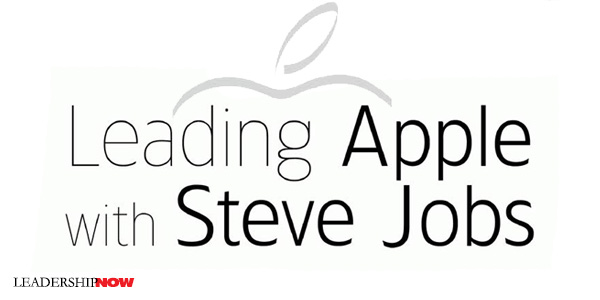 Leading Blog | Posts by Month |
 Leading Blog | Posts by Month |
10.31.12

LeadershipNow 140: October 2012 Compilation
Posted by Michael McKinney at 09:38 AM
10.30.12

In This World, You Can’t NOT Communicate!
IN OUR WORLD – and in the world of business – virtually nothing is neutral. Sharks swim to stay alive – even while resting or sleeping. A carefully wrapped present says something quite different than a present that’s not wrapped so nicely. Similarly, everything you do or don’t do, and everything you say or don’t say, communicates something to those around you. As a leader this is vital because all eyes are on you – all the time. People read into your comments and actions. Who gets recognized in a meeting regularly? Did it look like your mind was wandering during that conversation? Is your door often closed? Do you smile? Everyone creates perceptions of you based on your actions and their experiences and biases. The reality is – You can’t not communicate. If that’s the case, you might as well get better at it. Communicating in business Effective leaders recognize their ability to achieve results from their direct reports – to generate engagement, to motivate, to get their team headed in the right direction – often succeeds or fails based on their ability to communicate. Their business results, and their ability to move people to action, are achieved by communicating strategically and doing it well; they are Leader-Communicators. In business, communication that has meaning is a difference maker. It can be used to build understanding, and make teams and individuals more efficient. It can be used to recognize good work and reinforce critical behaviors. It can be used to coach or mentor one person, or lead organizational change. It can share a vision, inspire confidence, strengthen a business and build a legacy. Real communication is a differentiator that can make you a business superhero. Become a “superhero” It’s not that difficult to be a communication superhero. And when you consider the strengths it offers you as a leader, I’d say it’s relatively easy. It might not feel that way all the time. In fact, sometimes it feels easier to just say nothing and keep going – but remember by not communicating you actually are communicating. What does it take to communicate well? Just like any learned skill, practice – simple, consistent practice. Here are a few tips to practice:
Like any great speaker, listen to feedback – then apply it and keep practicing. Learn the skill; understand the fundamentals, practice, practice, practice. You too can be a communication superhero! Now that you know you can’t not communicate, what are you actually communicating today?  
Posted by Michael McKinney at 09:08 AM
10.23.12

quickpoint: The Long Tail of Talent The labor markets are changing. With the Internet proximity is not an issue. Chris Anderson describes it this way in Makers: The New Industrial Revolution: The labor markets are changing. With the Internet proximity is not an issue. Chris Anderson describes it this way in Makers: The New Industrial Revolution:
"The Web allows people to show what they can do, regardless of their education and credentials. It allows groups to form and work together easily outside of a company context, whether this involves “jobs” or not. And these more informal organizations are much less constrained by geography; talented people can live anywhere and shouldn’t have to move to contribute." What does this mean? “The new era will not mark the end of the blockbuster, but the end of the monopoly of the blockbuster. So, too, for manufacturing. What we will see is simply more. More innovation, in more places, from more people, focused on more narrow niches. Collectively, all these new producers will reinvent the industrial economy, often with just a few units at a time—but exactly the right products for an increasingly discriminating consumer.” 
Posted by Michael McKinney at 11:39 PM
10.22.12

Renegades Write the Rules
AMY JO MARTIN has written a book about connecting. About being human. Renegades Write the Rules is about how to connect with other people using the medium of social media. But you’ll find you can apply the principles in many other ways too. She stresses the importance of just being you. Especially when it comes to exposing yourself using social media, that can be an uncomfortable place. “We all have the tendency toward the creation of a veneered version of our brands that we think is more acceptable, more compelling, more marketable to our audience. … Ultimately it makes you less human.” You begin by using social media to listen; to find out what matters to your audience. And then consistently deliver it. Importantly she notes, “Being excellent still earns an audience these days, but to keep them and attract more requires giving them something more personal….Without the ability to nurture loyalty through human connection, your brand’s value relies solely on performance.” Let that sink in. People don’t buy your what, they buy your why. Martin takes you through 8 essential renegade rules using good examples from her own experience and the organizations and people she has worked with like Dwayne Johnson (@TheRock), Shaq (@shaq), and Tony Hsieh (@TonyHsieh). Her philosophy is that “Renegades experiment and fail early so when everyone else jumps on the bandwagon, their best practices are being polished while others’ are just starting to fail. Sometimes it’s not about being the best or smartest; it’s about being the first to try and the first to learn from failure.” I found all of the chapters helpful, but one of my favorite sections came in the appendix. Martin shares fifteen lessons she wishes she had known from the beginning. Here are eight of them:

Posted by Michael McKinney at 11:01 PM
10.19.12

Leading Apple With Steve Jobs
JAY ELLIOT, former Senior Vice President of Apple, has spent a lot of time with Steve Jobs. In Leading Apple with Steve Jobs, he writes that “Isaacson’s Steve is not the Steve I knew.” He believes that there has been too much focus on the negative aspects of how Jobs dealt with people and not enough on the positive. “I think,” he writes, “most people who worked for him, including me, would say they did the best work of their lives for him and don’t regret the experience a bit.” While his stories regarding his time with Jobs don’t do much to polish his image, he does bring out aspects of his thinking that undoubtedly have given people the opportunity to feel that in spite of the negative aspects of Jobs' behavior, Apple is where they wanted to be. When analyzing anything, it always a challenge to pull out the important lesson and learn how to integrate the good without the bad. We are all a complex mix of motivations and behaviors and everything we do seems like an indispensable part of achieving our success (or not). But we can always improve—diminish the negative and emphasize the positive. It is not unusual for any of us to find ourselves in a position where our intention is admirable but we lack the skill to implement it in the most beneficial way. Frequently, we can find ourselves stuck without alternatives to our own patterns of behavior. As leaders, we have to constantly be learning—by reflection and reading about the lives of others—to discover where we could expand our thinking and therefore our options. Not only does Elliot help us understand why Jobs was the way he was, he does a good job of explaining the development of and reasoning behind much of the Apple mystic that is worth implementing. Jobs said that “It’s not my job to pull things together from different parts of the company and clear the ways to get resources for the key projects. It’s my job to push the team and make them even better, coming up with more aggressive visions of how it could be.” Jobs believed that accountability, attention to detail, perfectionism, simplicity, and secrecy, would sustain innovative leadership at Apple. Getting the right people was as important to Jobs as creating a new product. “When you’re in a startup, the first ten people will determine whether the company succeeds or not.” Elliot says that he learned from Jobs the value of “knowing your own values so well that you can instinctively recognize someone who shares those values.” It would be good to reflect on our own values from this standpoint. Another way of thinking about this would be to consider: if you don’t know why you do what you do, why would anyone want to follow you? The right people make the difference. “A leader in the Steve Jobs model needs to have a set of lieutenants who can translate his goals and vision into detailed action plans. The success of Apple through the years has largely been due to Steve’s talent for surrounding himself with people who could bear the heat when he wasn’t satisfied, were strong enough to stand up to him when he was wrong, and were able to relay not just his instructions but his commitment, drive, and vision to the crew.” 
Posted by Michael McKinney at 02:54 PM
10.16.12

If it were just about leading, would you still want to be a leader?
IMAGINE for a moment that you as a leader didn’t have all the perks that often accompany positions of leadership—no lease car, no reserved parking space, no special dining rooms, offices, furnishings or refreshments and certainly not the compensation that creates jealousies. Would you still want to be a leader?
What if no one had to think that your way was always the best way? What if you had to ask as much as you told? What if being “in-charge” meant that it was your job to put others first? What if those you led got all the credit? Would you still want to lead?
What if all you got were the intrinsic rewards of leadership—the satisfaction of seeing others grow to their potential, perform to their best ability and knowing that you enabled that to happen, knowing that you were the catalyst, the spark, the steady, guiding hand throughout the process? Would that be enough to motivate you to lead? To deal with the downside of leadership?
Because of its demands, without a doubt, good leaders should be rewarded. But we need to ask frequently, “What are we in it for?” If we are in it for ourselves or just to make our dreams come true, our gains will go when we go. In our own mind, it can’t be about what we get but what we give. If we’re in it for the rewards, it will skew our thinking and diminish our role as a leader. It will create a culture where everything rests on the leader. And that’s not leadership, that’s self-promotion.
Posted by Michael McKinney at 10:15 AM
10.11.12

Rebel Entrepreneurs Avoid Conventional Wisdom There is a dirty little secret that most famous entrepreneurs and those that back the start-up culture prefer not to tell you—success in business is a minority sport. In most developed countries, the overwhelming majority of all privately held enterprises are small – about 95 per cent, according to the OECD, the economic body that measures such things. The vast majority of these are sole traders. There is also an incredibly high failure fate among new ventures. About 8 out of every 10 of the companies started each year do not make it to their fifth birthday. Only a small percentage of those businesses that manage to struggle on beyond infancy then go on to create the real growth drivers of an economy. However, it is these companies that are so important to the success of economies, providing new products and services as well as improvements in productivity that raise the standards of living of a society, and, perhaps most importantly, the lion’s share of new private sector jobs. Just 7 per cent of businesses are responsible for more than half the new employment created in the UK economy, the British think tank Nesta recently calculated. This figure is about the same across developed nations, according to the OECD. Nesta went further than this in its analysis, however, concluding that the job creation is actually only happening among very young fast-growing companies. Successful entrepreneurship, it seems, is a very exclusive club indeed. What is it that sets these companies apart? One way to define them and their leadership is as rule breakers. That is what my book, The Rebel Entrepreneur, is all about. I am not saying that founders can only succeed by engaging in illegal behaviour. Sadly, there have been too many examples of this in recent years, but these people are criminals not wealth creators. No, the true rebel entrepreneur knows that the best way to get ahead is to avoid being sucked in by conventional wisdom. Take pricing strategies, for instance. In hard times, conventional wisdom may say cut your prices to preserve customer numbers and therefore sales. However, as many successful companies have shown, the best policy is often to raise your prices. Look at Apple, the world’s most successful technology business, which insists on raising the prices of its products even as the western world struggles to recover from recession. Does this put off the customers? Not a bit of it. In fact, the high price appears to act as a guarantee of quality. More than this, by maintaining the high price, Apple is able to continue to increase revenue and profit even if sales dip. Rebel entrepreneurship can be found in most areas of business building if you are prepared to look. Just be prepared to resist following the crowd. Jonathan Moules is the Enterprise Editor for The Financial Times, where he has profiled hundreds of companies and their owners. He has written extensively on successful entrepreneurs. Moules spent 5 years in the FT's New York office, where he held numerous positions, including technology, media and telecoms news editor. He wrote specifically about the US mobile phone industry and new media businesses, and he covered the dotcom bubble and its aftermath. 
Posted by Michael McKinney at 07:09 PM
10.03.12

Feedback Can Be Fun
WHY DO PEOPLE all over the world enjoy participating in games and sports? Why have games and sports been going on for not just centuries, but millennia? One of the theories is that they provide immediate feedback. The batter in a neighborhood game of softball knows immediately if he hits or misses the ball. If it is hit, it is clear whether it is in bounds or a foul ball. It’s clear if it bobbles into the infield or sails over the fence for a home run. The tennis player learns immediately how the angle of the racket and the strength of the swing can cause the ball to be returned too low and hit the net or if it is hit too high and too hard it goes out of bounds. Indeed, a good part of the joy and appeal of every sport is this immediate feedback. It also enables the player to make an infinite number of adjustments necessary to improve performance. It’s important for organizations to become feedback-rich environments in which information flows freely and is accepted and acted upon. It is obviously not enough to simply have feedback given if it is angrily rejected or dismissed because of the source. There is a Swedish proverb that says, “With the eating comes the appetite.” We have found that the more that feedback is shared in organizations, the more easily it is digested and acted upon. Attitudes about feedback in companies that have been doing 360-degree feedback for 25 years are extremely different from those doing it for the first time. Within organizations that routinely provide feedback, there is a much higher degree of eagerness to get data. At the same time, there is a calm and ease about being able to dismiss the occasional outlier number or comment. Good things come from asking for feedback. Seeking the opinions of others has a host of benefits. It conveys respect. It reduces barriers between the levels. Managers learn valuable information that comes in no other way. Empirically it reduces by 10 percent the number of employees who intend to leave. Clearly the ideal is for managers to both give and get, but if you had to choose one or the other, our data suggests that it is better to receive than to give.  
Posted by Michael McKinney at 11:01 PM
10.01.12

First Look: Leadership Books for October 2012Here's a look at some of the best leadership books to be released in October.




For bulk orders call 1-800-423-8273  Build your leadership library with these specials on over 120 titles. All titles are at least 40% off the list price and are available only in limited quantities. “If we encounter a man of rare intellect, we should ask him what books he reads.” — Ralph Waldo Emerson
Posted by Michael McKinney at 12:00 AM
|
BUILD YOUR KNOWLEDGE


How to Do Your Start-Up Right STRAIGHT TALK FOR START-UPS 
Grow Your Leadership Skills NEW AND UPCOMING LEADERSHIP BOOKS 
Leadership Minute BITE-SIZE CONCEPTS YOU CAN CHEW ON 
Classic Leadership Books BOOKS TO READ BEFORE YOU LEAD |
|